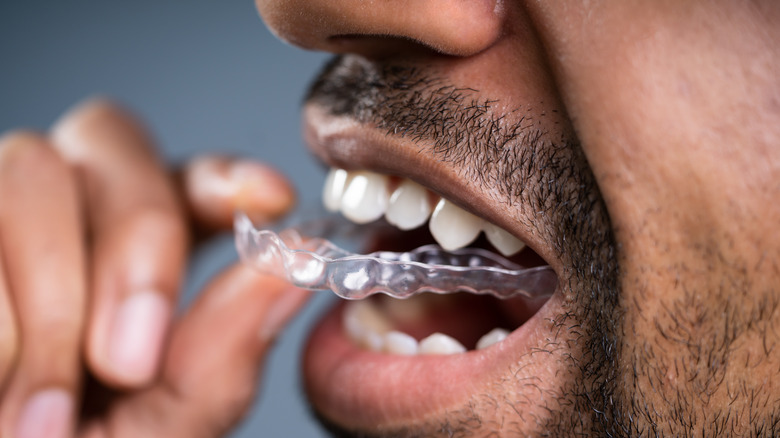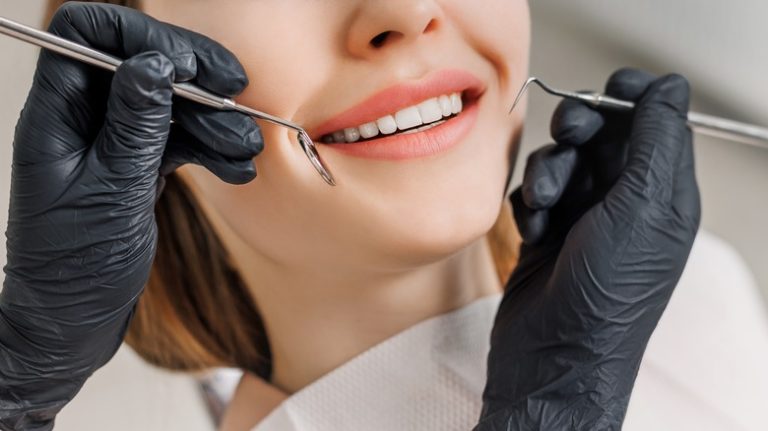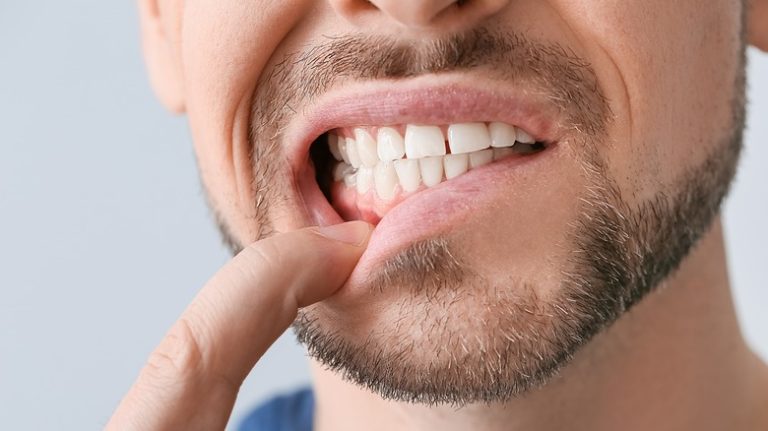Believe it or not, dental hygiene might be more important than you realize. That’s because it’s essential for maintaining good oral health. Establishing a good oral care routine can help keep your teeth strong and healthy by preventing plaque buildup and keeping harmful bacteria at bay (via Bethesda Family Dentistry). Failing to do this can lead to more serious conditions and increase your risk of developing gum disease and tooth decay.
That’s why it’s important to maintain a good oral care routine. However, there are some dental hygiene habits that can end up causing more harm than good, even if they do end up going viral on social media. In an exclusive interview with Health Digest, dentist and Chief Clinical Officer with SmileDirectClub Dr. Jeffrey Sulitzer, DMD, shares his expert tips on how you can improve your overall oral routine and explains the most common dental hygiene habits you should avoid.
Letting stress impact your oral hygiene

One of the most common dental hygiene habits that you should try to avoid is letting stress impact your oral health, according to Sulitzer. As it turns out, stress can take quite a toll on your health and make it difficult to maintain good dental hygiene every day. “Individuals may clench their jaws or grind their teeth when experiencing stress, which can cause TMJ, chipped teeth from wear and tear, and pain when chewing,” Sulitzer explains.
This can lead to more serious dental conditions in the future, like cavities and dental decay, among others. That’s why it’s important to find safe and simple ways to both protect and care for your teeth. “Simplify your oral care routine with affordable and effective products,” Sulitzer says. “Mouthguards and aligners may help with mild grinding by acting as a protective barrier for your teeth.” Aside from brushing your teeth, Sulitzer also highly suggests cleaning your tongue and the roof of your mouth.
Using homemade whitening methods
Another common dental hygiene habit that you should never do is use homemade teeth whitening methods. Sulitzer says that many DIY teeth whitening products contain hydrogen peroxide, which is not safe to use inside your mouth. “Consumers who want to use ‘over-the-counter’ whitening solutions or toothpaste should use products made by oral care manufacturers, where the hydrogen peroxide solution is safe and effective,” Sulitzer explains.
You can also ask your dentist for advice on safe and effective whitening products and in-office whitening treatments or do your own research on safe and affordable whitening kits. In fact, some dental offices offer at-home whitening kits that are enamel-safe and can guarantee a whiter smile in just one week without the discomfort of sensitivity, he shares. Others also offer fast-dissolving whitening strips, which tend to be quicker and less messy than non-dissolving strips. When in doubt about any potential treatment, it’s always best to consult your dentist.
Brushing too hard or not enough
Pornprapa Korprasert/Shutterstock
Brushing your teeth too hard or not enough can also harm your dental health. That’s why it’s important to use a quality toothbrush and refrain from brushing your teeth too aggressively, according to Sulitzer. “Make sure you are using a soft-bristled brush and not pressing too hard while you brush,” Sulitzer says. The dental expert recommends picking up an electric toothbrush that has a three-bristle blend, which will gently scrub and leave teeth cleaned 50% better than any manual toothbrush.
One way to know if you’re brushing too hard is if the bristles on your toothbrush are frayed. Sulitzer asserts that using subscription toothbrush head replacement options for your electric toothbrush can help keep your brushes fresh and prevent the bristles from becoming too dull and frayed since they need to be replaced every three months. “Finally, brushing your teeth at least twice daily and after eating will help maintain a healthy smile, along with regular dentist visits,” he explains.
Forgetting to floss
fizkes/Shutterstock
In addition to not brushing too hard, it’s also important to floss your teeth every day. According to Sulitzer, flossing one to two times per day is an essential part of your oral care routine. That’s because it can help remove any hidden food and bacteria lodged in between your teeth. However, Sulitzer says that traditional flossing techniques may not be the best way to clean in between your teeth.
If performed incorrectly, they can “create issues reaching deeper plaque within gums, causing a buildup and more bacteria to wear away at the enamel,” he shares. “Using floss picks may seem like an easy solution to flossing, but most people are not using those picks correctly, and sometimes they spread bacteria around your mouth.” As a result, Sulitzer recommends using a water flosser, which can remove 99% of the plaque stuck in your teeth, while also preventing any stains from developing.
Participating in dangerous social media trends
XanderSt/Shutterstock
Furthermore, Sulitzer advises against participating in dangerous social media trends, like the recent viral TikTok trend that involves using Mr. Clean magic erasers to whiten one’s teeth. Sulitzer says that this trend is incredibly dangerous and could end up removing most of the enamel on your teeth. “Magic erasers contain chemicals that are not safe to be swallowed, such as melamine, a derivative of formaldehyde, an embalming fluid,” he explains.
“By using this product on your teeth, you will ultimately scrub away most of your enamel, which is why your teeth may appear whiter.” That’s why the product’s packaging explicitly states not to use it on your skin or any other part of your body. Using a magic eraser on your teeth could be detrimental to your dental hygiene and overall health. “Enamel is the hardest tissue in the body, but it is not living, so it can’t naturally regenerate,” Sulitzer says. “Once you lose enamel, it’s gone.”
To learn more about Dr. Jeffrey Sulitzer, visit SmileDirectClub.


